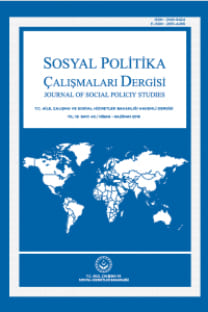ULUSLARARASI SİSTEM ÇERÇEVESİNDE BİR ULUSLARARASI ÖRGÜT ÖRNEĞİ: BMMYK
Uluslararası örgütler, BMMYK, mülteciler, uluslararası sorunlar, ulusal çıkarlar
AN INTERNATIONAL ORGANIZATION CASE WITHIN THE FRAMEWORK OF INTERNATIONAL SYSTEM: UNHCR
___
- Betts, A. and Loescher, G. (2011). Refugees in international relations. A. Betts and G. Loescher. (Ed.), In refugees in international relations (pp. 1-27). Oxford: Oxford University Press.
- Biehl Öztuzcu, K. S. (2008). Governing through uncertainty: ‘refugeeness’ in Turkey (Unpublished Master’s Thesis). Boğaziçi Üniversitesi: İstanbul.
- Bull, H. (2011). Foreword. A. Betts and G. Loescher. (Ed.), In refugees in international relations (pp. vii-xiii). Oxford: Oxford University Press.
- Chimni, B. S. (2004). From resettlement to involuntary repatriation: towards a critical history of durable solutions to refugee problems. Refugee Survey Quarterly, 23(3), pp. 55-73.
- Crisp, J. (1999). Policy challenges of the new diasporas: migrant networks and their impact on asylum flows and regimes. Geneva: UNHCR Policy Research Unit Press.
- Dai, X. (2007). International institutions and national policies. Cambridge: Cambridge University Press.
- Haas, E. B. (1990). When knowledge is power: three models of change in international organizations. California: University of California Press.
- Haddad, E. (2008). The refugee in international society: Between sovereigns. Cambridge: Cambridge University Press.
- Hammerstad, A. (2011). UNHCR and the Securitization of Forced Migration. A. Betts and G. Loescher. (Ed.), In refugees in international relations (pp. 238-260). Oxford: Oxford University Press.
- Joachim, J., Reinalda, B. and Velbeek, B. (Ed.) (2008). International organizations and implementation: Enforcers, managers, authorities. New York: Routledge Taylor&Francis Group.
- Kalınbayrak, B.N. (2013). A post-structuralist approach to the UN based international refugee regime (Unpublished Master’s Thesis). Hacettepe Üniversitesi: Ankara.
- Keskin, F. (2005). BM ve Türkiye: Uluslararası barış ve güvenliğe ilişkin sorunlar. Ankara: Ekin Yayınları.
- Loescher, G. (2001). The UNHCR and the world politics: a perilous path. Oxford: Oxford University Press.
- Muravchik, J. (2005). The future of the united nations: Understanding the past to chart a way forward. Washington: The AEI Press.
- Nyers, P. (2006). Rethinking refugees: beyond states of emergency. New York: Routledge Taylor&Francis Group.
- UNHCR (2006). The state of the world’s refugees: Human displacement in the new millenium. Oxford: Oxford University Press.
- UNHCR (2011). Convention and protocol relating to the status of refugees. New York: UNHCR.
- UNHCR (2014a). Global appeal 2015 update: Headquarters (operational support and management). Retrieved from www.unhcr.org/5461e60f0.pdf, on 20.12.2014.
- UNHCR (2014b). UNHCR global appeal 2015 update: Turkey. Retrieved from www.unhcr.org/5461e60c52.html, on 20.12.2014.
- UNHCR (2015a). A helping hand. Retrieved from www.unhcr.org.tr/?lang=en&page=59, on 07.04.2015.
- UNHCR (2015b), A global humanitarian organization of humble origins. Retrieved from http://www.unhcr.org/pages/49c3646cbc.html, on 07.04.2015.
- UNIHP (2005). Reflections on United Nations development ideas. Proceedings of the Conference (pp. 5-16). Geneva: UNIHP.
- Whittaker, D. J. (2006). Asylum seekers and refugees in the comtemporary world. London: Routledge Taylor&Francis Group.
- ISSN: 2148-9424
- Yayın Aralığı: 4
- Başlangıç: 2012
- Yayıncı: Aile,Çalışma ve Sosyal Hizmetler Bakanlığı
İSLAM MEDENİYETİNDE BİRLİKTE YAŞAMA KÜLTÜRÜ
DIŞ YARDIM NEDİR? NİÇİN YAPILIR?
FARKLI KÜLTÜREL ORTAMLARA GÖÇTE YAŞANILAN KAYGI VE BELİRSİZLİK SORUNU
SOSYAL PERFORMANSIN ÖLÇÜMÜNDE YENİ YÖNTEM VE TÜRKİYENİN GÖRÜNÜMÜ
Selim COŞKUN, Nazlıhan ÖZGENÇ, Samet GÜNEŞ
ULUSLARARASI SİSTEM ÇERÇEVESİNDE BİR ULUSLARARASI ÖRGÜT ÖRNEĞİ: BMMYK
